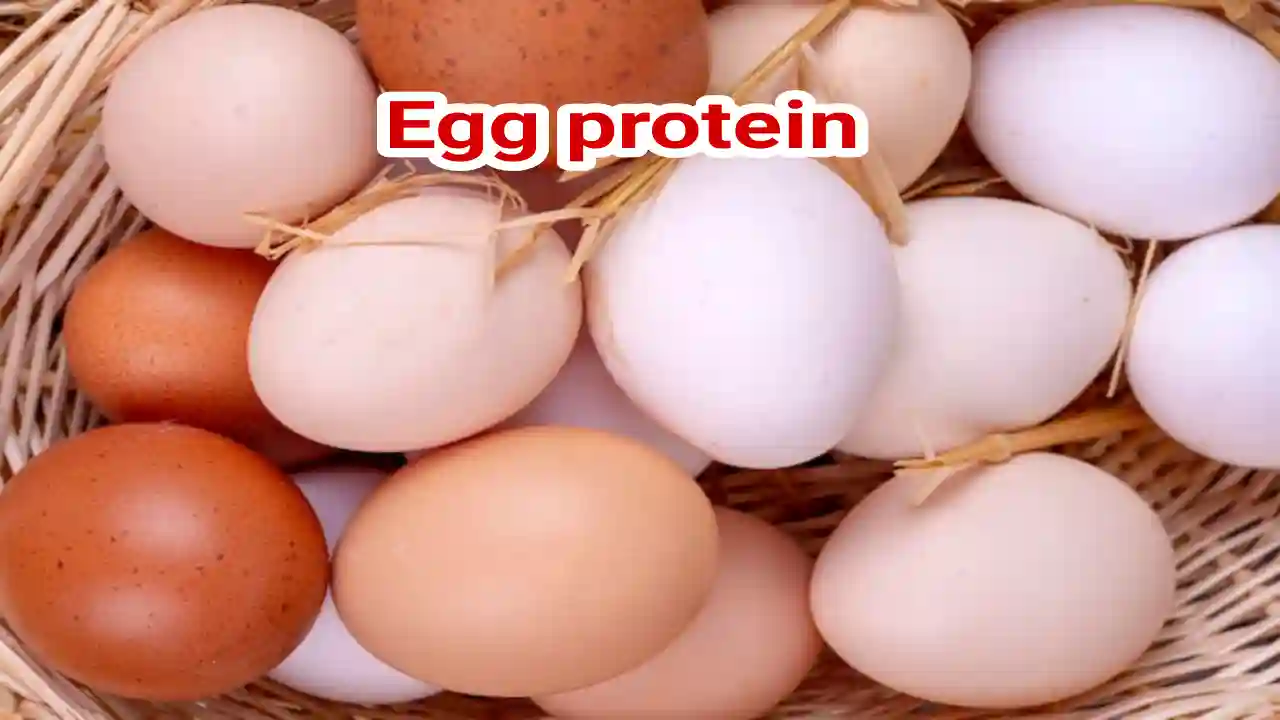An average hen’s egg is considered an excellent and economical source of protein. If you ask How much protein in 1 egg. Then answer is A large egg (about 50 grams) contains about 6 to 7 grams of high-quality protein. This protein is called “complete protein” because it contains all the nine essential amino acids. Which the body cannot make on its own. The white part of the egg contains about 3.6 grams of protein and the yolk contains about 2.7 grams of protein. Egg protein is close to 100 in biological value, that is, the body can absorb it very easily.
And use it for muscle repair, tissue growth and enzyme production. It is an excellent and natural protein source for people recovering from fitness, bodybuilding or illness. Apart from protein, eggs are also helpful in increasing immunity. This helping in hormone production and keeping hair, skin and nails healthy.
Eggs can be easily included in boiled, bhurji, omelette, poach or many other recipes. However, balanced consumption is important. So a healthy person can easily eat an egg every day. But people with special health problems should consult a doctor. Overall, an egg is an easy and inexpensive source of nutrient-rich protein.
Related:- Paneer tikka roll recipe
What is egg protein
Egg is considered a complete food as it contains all the amino acids. And high quality protein required by the body. Egg protein is mainly divided into two parts like egg white and yolk. Egg white is almost completely made up of protein. While the yolk contains protein along with fat, vitamins and minerals. A medium-sized egg contains about 6 to 7 grams of protein. This protein is considered the best in terms of “biological value”. As it is easily digested and absorbed by the body immediately.
Egg protein is extremely beneficial for muscle building, bone strength, skin and hair health. Apart from this, it is also helpful in the development of children, increasing immunity and providing energy. Therefore, egg is an inexpensive, easily available and nutritious source of protein. Which is beneficial to include in a balanced diet.
How much protein in 1 egg with different weight
The amount of protein in an egg depends on its size and weight. Typically, the egg white provides the most protein. While the yolk contains vitamins, minerals and fat. Below are the approximate amounts of protein in eggs of different weights and size
- Small egg (about 40 grams) – About 4.5 grams of protein
- Medium egg (about 50 grams) – About 6 grams of protein
- Large egg (about 60 grams) – About 7 grams of protein
- Extra large egg (about 70 grams) – About 8 grams of protein
- Very large egg (about 80 grams) – About 9 grams of protein
Egg nutrients
Egg is considered a complete food rich in nutrients. It contains protein, vitamins, minerals and essential fats in proper amounts. The main nutrients of eggs are as follows.
Protein :- Egg provides high quality protein. Which is helpful in muscle growth, tissue repair and enzyme formation in the body.
Vitamins:- It is rich in vitamins A, D, E, K and B-complex (especially B12 and riboflavin). Which strengthen eye health, energy production and immune system.
Minerals:- Iron, calcium, phosphorus, zinc and selenium are found in eggs. Which are essential for bones, teeth and blood formation.
Healthy Fats:- Egg yolk contains omega-3 fatty acids and monounsaturated fats. Which are beneficial for heart health.
Choline:- This nutrient is helpful in increasing brain development and memory. Egg is a low calorie but nutritious food. Which is beneficial for everyone including children, youth and the elderly.
Types of protein found in egg
1- Ovalbumin:- The most abundant protein (about 54%) in egg white, acts as an energy source.
2- Ovotransferrin:- It is a protein with anti-bacterial properties, which binds iron.
3- Ovomucoid:- Found in egg white and has the ability to block digestive enzymes.
4- Ovomucin:- Provides thickness to egg white and has antimicrobial properties.
5- Lysozyme:- Protein that destroys bacteria.
6- Vitelins:- Main proteins found in egg yolk.
7- Phosvitin:- Present in egg yolk, which binds minerals.
10 Benefits of egg protein
It containing all the essential amino acids and high quality protein. That helps in muscle growth, tissue repair and energy production. It is also beneficial in controlling weight, increasing immunity and strengthening bones. Egg protein is easily digestible and nutritious. Let’s know 10 benefits of egg protein.
Muscle growth and repair tissues
Egg protein is a high-quality complete protein, containing all the essential amino acids. It is extremely beneficial for building muscles, increasing their strength. And repairing tissues after exercise. Regular consumption of eggs provides the body with the necessary nutrition. Which leads to faster muscle growth and less fatigue. It is especially beneficial for athletes, bodybuilders and people with an active lifestyle.
Helpful in weight control
Egg protein easily digest and makes the stomach feel full for a long time. This reduces the desire to snack unnecessarily and take extra calories. This property is helpful for people wishing to lose weight or control weight. Eating eggs for breakfast controls hunger throughout the day and also keeps the metabolism active. Which speeds up the process of burning fat.
Strengthens bones and teeth
Egg protein improves the absorption of calcium and phosphorus in the body. It is helpful in maintaining bone density and making them stronger. Its consumption reduces the risk of osteoporosis and weakening of bones. Egg protein is especially beneficial for children and the elderly. As it keeps their bones and teeth healthy.
Boost immunity
Egg protein strengthens the body’s immunity. The amino acids and essential nutrients present in it. They provide the body with the power to fight infections and diseases. This protein also helps in rebuilding cells. Which helps the body recover quickly. And immunity remains strong for a long time.
Beneficial for skin and hair
Egg protein helps keep the skin supple and glowing. The amino acids present in it nourish the skin cells. And increase collagen production, which reduces wrinkles. Apart from this, it strengthens the hair roots. And also reduces the problem of hair loss.
Provides energy and stamina
Egg protein provides long-lasting energy to the body. It keeps the blood sugar level stable and reduces fatigue. Its consumption increases physical stamina. Which allows better performance during work or exercise. It is especially beneficial for people who play sports or do hard work.
Improves metabolism
Egg protein increases the body’s metabolism. It speeds up the process of digesting food and converting it into energy. Due to better metabolism, less fat is deposited and calories are burned quickly. Regular consumption keeps the body weight balanced and health remains better.
Helpful in hormone balance
Egg protein plays an important role in the body’s hormone production and balance. The amino acids present in it help in the production of various hormones. Which keeps physical and mental health good. It is beneficial for both women and men as it also supports reproductive health.
Beneficial for heart health
Egg protein helps in controlling cholesterol levels and keeps the heart muscles strong. It is helpful in keeping blood pressure stable and reduces the risk of heart diseases. Consuming eggs in balanced amounts is useful for the overall health of the heart.
Increases mental development and concentration
Egg protein nourishes brain cells and increases their efficiency. It improves memory, concentration and learning ability. It is especially beneficial for children and students. As it supports their mental development. And helps them stay focused for a longer period of time.

Egg omelette recipe
Ingredients:-
- Eggs – 2
- Onion – 1 (finely chopped)
- Tomato – 1 (finely chopped)
- Green chilli – 1 (finely chopped)
- Green coriander – 2 teaspoons (chopped)
- Salt – according to taste
- Black pepper powder – ½ teaspoon
- Oil or butter – 1 tablespoon
Method:-
1:- Break the eggs in a bowl and beat them well.
2:- Add salt, black pepper powder, onion, tomato, green chilli and green coriander and mix well.
3:- Heat the pan and add oil or butter to it.
4:- When the oil is hot, spread the egg mixture on the pan.
5- Let it cook on one side on low flame, then turn it with a spatula and cook on the other side till it becomes golden.
6:- Take out the prepared omelette on a plate and serve hot.
Side effects of egg
Eggs are rich in nutrition, but in some cases, consuming them can cause side effects. People who are allergic to eggs may experience skin rashes, itching, swelling or difficulty breathing. Eating too many eggs can increase cholesterol levels. Which can increase the risk of heart disease. Eating raw or undercooked eggs can cause infection with a bacteria called salmonella.
Which causes stomach pain, diarrhea and fever. Excessive consumption can also cause digestive problems such as gas, acidity or bloating. Also, people who have liver or kidney diseases should limit the amount of egg yolk. Eggs are generally safe and nutritious when consumed in the right quantity and cooked properly.
Egg protein related FAQs
Ans. A medium-sized egg (about 50 grams) contains an average of 6 to 7 grams of protein.
Ans. Egg white is the biggest source of pure protein. While the yolk also contains some amount of protein along with fat and vitamins.
Ans. Yes, eating 1-2 eggs daily can provide the body with high-quality protein. Which helps in muscle repair and growth.
Ans. Yes, egg protein helps in building muscles, making healthy weight gain possible, especially when taken along with exercise.







